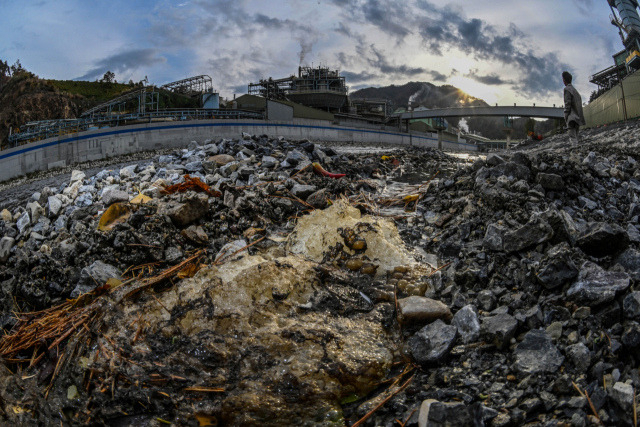 |
A stream near Young Poong's Seokpo zinc refinery in North Gyeongsang Province. (Park Hae-mook/The Korea Herald) |
Young Poong, a Korean zinc smelter, has come under fire for environmental violations and an array of industrial accidents occurred at its Seokpo refinery.
According to the company, its Seokpo refinery in North Gyeongsang Province was ordered by the Supreme Court to shut down for two months for violating a water conservation law. It is the world's sixth-largest zinc producer, which makes up around 2.4 percent of global production in 2023, according to global energy data provider Wood Mackenzie.
The plant, the world's sixth-largest zinc producer, was found to have discharged polluted wastewater in 2019 without proper treatment and authorization. The schedule for the suspension of operations has not yet been determined.
Given the smelter's presence in the global zinc market, the operational suspension is expected to have repercussions on zinc prices, with Young Poong already inducing uncertainties on possible supply disruptions due to its ongoing attempt to take full control of the world's largest zinc smelter Korea Zinc.
Young Poong has been in a fierce battle to obtain a controlling stake in Korea Zinc, launching a multibillion-dollar tender offer together with Seoul-based private equity firm MBK Partners.
With strong resistance from Korea Zinc's management to fend off the takeover deal, the two company's zinc smelting businesses have been taking a toll from the lengthy ownership dispute, inviting a growing concern for their production and supply capabilities.
Environmentalists and local residents have long been raising concerns over the zinc smelter plant’s location and water and air pollution issues.
Established in 1974, the Seokpo site with 325,000 tons of annual capacity is located in a pristine mountain valley at the uppermost reaches of the Nakdong River, just 6 kilometers from Taebaeksan National Park.
Seokpo, home to a population of about 1,800, has been exposed to hazardous pollutants such as sulfur dioxide, sulfuric acid and cadmium fumed during the process of extracting zinc from imported ore.
Unlike other metal smelters typically located in industrial zones, Young Poong’s decision to build and sustain the factory in the village put the residents’ health under threat.
Young Poong’s lax safety protocols and environmental negligence came into the limelight, prompting lawmakers grilled Jang Hyung-jin, an adviser to Young Poong, during a parliamentary audit on Oct. 24.
Some 15 workers were found to have died in industrial accidents at the Seokpo refinery operated since 1997.
Rep. Lim Lee-ja of the ruling People Power Party shed light on the atrocities committed by the Seokpo refinery, including the release of cadmium heavy metals into the Nakdong River in 1979, damage from a large-scale sulfuric acid spill in 1991 and the influx of 5,000 liters of sulfuric acid into a tributary of the Nakdong River due to the overturn of a tank truck in 1997.
“After investigating from 2014 to 2022, there were about 80 cases of violations of environmental laws,” she said.
Between December of last year and August of this year, three people who worked at the plant have died.
According to the indictment written by the Daegu District Prosecutors' Office, a worker at a subcontractor for the Seokpo refinery died of gas poisoning in December last year. The person in question allegedly wore a dust mask rather than an air-purifying respirator while working on replacing a motor, failing to protect himself against toxic leakage.
In the case, Young Poong CEO Park Young-min and Bae Sang-yoon, head of the Seokpo smelter, were arrested on charges of violating the Serious Accident Punishment Act and the Occupational Safety and Health Act.
Separately, Daegu District Court overturned the original decision in the appeal trial of Young Poong and its employee who were indicted on charges of violating the environment conservation law, sentencing them to a fine of 10 million won ($7,300) and 5 million won, respectively.
The worker was brought to trial on charges of discharging water pollutants directly to the environment without going through a sanitary sewer system.




![[Herald Interview] How Gopizza got big in India](http://res.heraldm.com/phpwas/restmb_idxmake.php?idx=644&simg=/content/image/2024/11/20/20241120050057_0.jpg)


![[KH Explains] Dissecting Hyundai Motor's lobbying in US](http://res.heraldm.com/phpwas/restmb_idxmake.php?idx=644&simg=/content/image/2024/11/20/20241120050034_0.jpg)